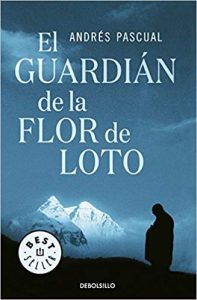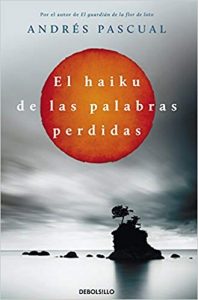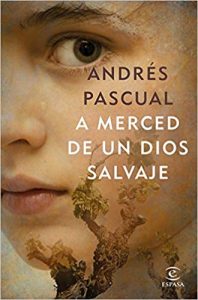Being a mystery novelist, the Riojan Andres Pascual It takes advantage on many occasions to decorate its plots with the most varied scenarios, enriched by that knowledge that it grants to the traveler, and even more to the traveler writer willing to find those enriching nuances of any plot, the journey through different parts of the world. Thus would be born "The guardian of the lotus flower" or "The haiku of lost words", two of his most acclaimed novels.
But the considerable bibliography of this author also immerses itself in the historical genre, in the booming Spanish noir or even in that kind of essay that borders self-help from the life experience as a journey towards self-knowledge.
Thus, address any book by Andrés Pascual It is always a surprising adventure towards fictions loaded with narrative tension, adventure and approach to cultures and enriching places in every way, towards practically informative aspects introduced with that know-how that entertains and surprises.
Top 3 recommended books Andrés Pascual
The keeper of the lotus flower
A novel that is revealed as the best manifestation of the great virtue of the author. It is not easy at all to achieve the balance between the informative and the plot, between the background and the form as the fundamental balance of any novel.
Even more so in a history peppered by Tibetan mysticism in contrast to a Western action in search of transcendental hidden answers, buried by the pragmatic interests of capitalism.
On many occasions we have heard of the ethical conflict that the development of medicine and pharmaceuticals by extension supposes, with their private nature loaded with investments in research and, why not say it, also commercial competitiveness.
What cannot be is that a panacea for medicine is suddenly announced in which no official industry participates. The Lama Lobsang Singay aims to be a new victim of these interests.
So when he prepares his Harvard lecture to talk about a great discovery, the lama ends up passing away. Of course, coincidences do not exist when it comes to such clamorous circumstances.
The normal thing in these cases is to review the sinisterness of the matter, to awaken theories about those same interests in action. Only someone who feels all lost can embark on the dangerous adventure of discovering what is behind the events. The clues point to a remote origin among the silent and icy peaks of the Himalayas. There, cut off from the world, Tibetan shamans could have written a hidden vademecum of universal medicine, between the esoteric and the natural.
Jacobo's journey, his exposure to all the dangers that will threaten him along the way, ends up composing the double plot of the story. The search unfolds and Jacobo's final encounter with himself may also point to the secret place where the long-awaited Treaty was hidden.
The haiku of lost words
Fat man, the nuclear bomb that fell on Nagasaki on August 9, 1945 as revenge postponed for the attack on Pearl Harbor, becomes the dramatic starting point for a two-time plot.
The transition from that fateful day to the present serves the cause of a parallel run through those pending issues that the past always leaves blank when the tragic intervenes with its intensity of the irreversible.
We then look at one of those intrahistories as beautiful as finally overshadowed by nuclear dust. Kazuo and Junko were two young people with a great future to share between furtive loves and promises between the beautiful and transcendental verses of a haiku.
Its history, sinisterly transformed in 1945, makes its way through fragments of a present that ends up serving the cause of recomposition, of the impossible replacement full of echo and revenge, those of a future that should have been.
The story in 2011 of the future of Emilian Zäch, a UN worker, seems very far from the original narrative. And yet the ties end up getting so close that they end up crossing with that nostalgia for the impossible and that hopeful glow of truth.
At the mercy of a wild god
This time, for the book At the mercy of a wild god, Andrés Pascual returns home to probe that black genre with touches of suspense, like a Victor of the Tree among Riojan vineyards.
When you visit San Vicente de la Sonsierra and witness his self-flagellation processions, you take back that atavistic impression of a religion transmitted as punishment, pentience, sacrifice and pain.
Nothing better than that ancestral touch for Andrés Pascual to insert into that imaginary a novel that delves into the darkness of the buried past, of guilt and silences ...
When Hugo and his son Raúl, an eleven-year-old boy with health problems, return to town to process the collection of an inheritance, they cannot imagine the sinister adventure they are about to enter.
Raúl is the spitting image of his uncle, remembered under that same childhood image, as the poor man ended up facing his tragic fate. The disappearance of the little boy, twenty years ago, has not completely departed from popular memory.
The strangeness of the matter seems to sink into the telluric, as if the earth had swallowed the young man so many years ago. The appearance of Raúl, his nephew, with his features practically traced, is guessed as a black omen that makes many inhabitants of the town go back to the fateful moment when their uncle disappeared forever.
Physical coincidences only lead us into the force of a gloomy, gloomy destiny, a kind of centripetal force towards fear that ends up moving a plot that has gradually become a disconcerting thriller.




1 comment on «The 3 best books of Andrés Pascual»